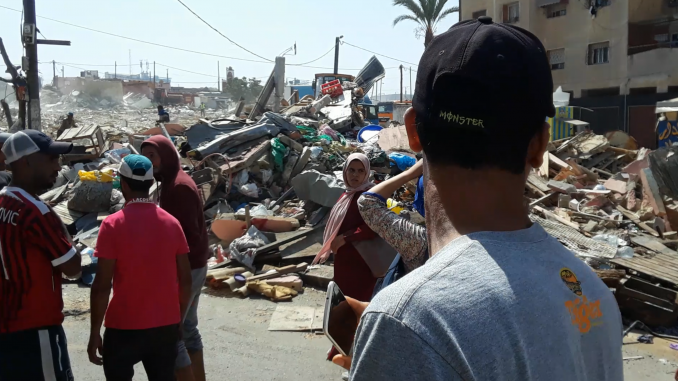
On the last week of September, a wave of evictions fell on the industrial neighborhood of Ain Sbaa, Northern periphery of Casablanca, Morocco. A huge police operation cleared more than 1,300 self-built houses in the beighborhood of Douar Wasti, settled in the area since the Thirties. Around 5,000 residents had been negotiating with the City Council for six months, and didn’t expect to be chased off their houses with snipers pointing at them from the buildings around, and with nothing more than the promise of obtaining, some day, plots of land 30kms far, in the rural area of Hay Hajjaj. For residents of Moroccan cities, the concept of hadaría, urbanity, is very important, and the risk of being sent to the countryside, in a rural area, is a new offense that adds violence to the eviction.
The evicted of Douar Wasti, together with other neighbors of Ain Sbaa also threatened of evictions, tried to organize a protest march to the Spanish frontier of Ceuta, in order to ask political asylum to Spain. This worried the Spanish media, and the march was quickly blocked by the Moroccan police. Then, the following weekend another neighborhood of the same area was evicted: Douar Hsibo. Again, 1,200 families were left without a house, forced to camp near the ruins of their old neighborhood. All these inhabitants are full of rage and disappointment towards the treatment they obtain from the authorities. Moreover, during the next week a young woman from Tetouan was killed by the Royal Navy while trying to reach Spain illegaly. And the Riff city of Alhuceima is on the verge of revolt.
As this video shows, through unpublished interviews and images, the words of the evicted make us understand that the demolition of the house represents a crisis for the rule of law and to nationality. One of the slogans the evicted sang goes Acch3ab yurid isqat ljensia, that is: the people wants to give up their nationality. This is also the meaning of the failed march to Ceuta. The state, which obtains legitimacy by using metaphors that refer to the house and the family, is brought into question when it betrays its task of protecting the houses of its citizens. If you tear down the houses, you will tear down the link with the state, with the government, with the rule of law. The people is here – they scream – but where is the king?
- PRESS :: Huffington Post Maroc, Ce que l’on sait de l’operation de délogement de douar El Ouasti de Casablanca, 25/9/2018 :: Solidarité Maroc, Les habitants d’un bidonville a Casa: nous ne sommes plus marocains!, 25/9/2018 :: H24 Maroc, Délogement sout haute tension des habitants de plusieurs bidonvilles, 26/9/2018 :: Two articles in the local press (in arabic): Hespress, The authorities explain the circumstances of the deportation, 28/9/2018 :: Alyaoum24, Residents of Ain Sbaa insist that they want to travel secretly to Europe, no date :: Huffington Post Maroc, Après la destruction de Douar Hsibou, les operations de démolition sont à l’arret, 4/10/2018.
- SELF-MADE VIDEOS :: A group of young people from Douar Wasti explain their position in relation to the evictions (September 28th) :: An old manin front of the ruin of his own house in Douar Wasti (September 18th) :: A man from Douar Wasti declares revolution against the king (September 28th)
- DECLARATIONS :: Reseau Marocain pour le Logement Décent, Expulsions à Casablanca, solidarités et propositions de RMLD, 1/10/2018 :: International Alliance of Inhabitants, Douar el Wasti, Evictions and massive removal, 25/9/2018.